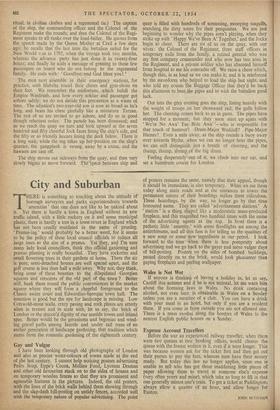City and Suburban
THERE is something so touching about the attitude of borough surveyors and parks superintendents towards ` amenities' that one does not like to be unkind about it. Yet there is hardly a town in England without its new traffic island, with a little rockery on it and some municipal plants, there is hardly a tree in a town street in England which has not been cruelly mutilated in the name of pruning. ' Prunus-ing ' would probably be a better word, for it seems to be the policy of these local council officials to reduce all ,large trees to the size of a prunus. Yet they, and T'm sure many lady local councillors, think this official gardening and prunus planting is really beautiful. They have rockeries and 'small flowering trees in their gardens at home. There the air is pure. semi-detached houses .are well spaced apart, and the golf course is less than half a mile away. Why not, they think, bring some of these beauties to the dilapidated Georgian squares and crescents of the old part of the town ? Better still, bank them round the public conveniences in the market square where they will form a cheerful foreground to the Classic assize court and Edwardian-baroque town hall. The intention is good but the eye for landscape is missing. Low Cotswold-stone walls, crazy paving and rock plants are utterly alien in texture and in scale with, let us say, the brick of London or the stucco'd dignity of our seaside towns and inland spas. Better would be the geraniums and begonias and wind- ing gravel paths among laurels and under tall trees of an earlier generation of landscape gardening, that tradition which stems from the romantic gardening of the eighteenth 'century.
Gay and Vulgar
1 have been looking through old photographs of London and also at precise' water-colours of towns made at the end of the last century. I cannot help noticing posters advertising Pars Soap, Epps's Cocoa, Mellins Food, Lyceum Dramas and other old favourites stuck on to the sides of houses and on temporary wooden fences so that they are prominent and agreeable features in the pictures. Indeed, the old posters, with the lines of the brick walls behind them showing through and the slap-dash bill-posting on untidy fences, accorded well with the temporary nature of popular advertising. The point of posters remains the same, namely that their appeal, though it should be immediate, is also temporary. When we see them today along main roads and at the entrances to towns the permanent nature of their hoardings makes them ridiculous. These hoardings, by the way, no longer go by that time honoured name. They are called ' advertisement stations.' A station' is a thing shaped like a modernistic mass-produced fireplace, and this magnified two hundred times with the name of the advertising agents at the top. In front there is a pathetic little ' amenity,' with some floodlights set among the antirrhinums, and all this fuss is for telling us the qualities of a new soap or some new ingredients in our petrol. I look forward to the time Vihen there is less pomposity about advertising and we go back to the gayer and more vulgar days of bill-posting. Posters on the sides of bombed buildings, pasted directly on to the brick, would look pleasanter than gaping fireplaces and peeling wallpaper.
Wales is Not Wet
If anyone is thinking of having a holiday in, let us say, Cardiff this autumn and if he is not teetotal, let me warn him about the licensing laws in Wales. No drink containing alcohol, not even beer, is obtainable in Wales on a Sunday unless you are a member of a club. You can have a drink with your meal in an hotel, but only if you are a resident there. If you come in from outside you are not allowed one. There is a mass exodus along the borders of Wales to the nearest English public houses on a Sunday.
Expense Account Travellers
Before the war an experienced railway traveller, when there were two queues at two booking offices, would choose the queue with the fewest women in it, even if it were longer. This was because women ask for the ticket first and then get out their purses to pay the fare, whereas men have their money ready. But today this law no longer applie-s, since one is unable to tell who has got those maddening little pieces of paper allowing them to travel at someone else's expense (very often yours and mine), which take so long to fill in that one generally misses one's train. To get a ticket at Paddington, always allow a quarter of an hour, and allow longer for Euston.


































 Previous page
Previous page